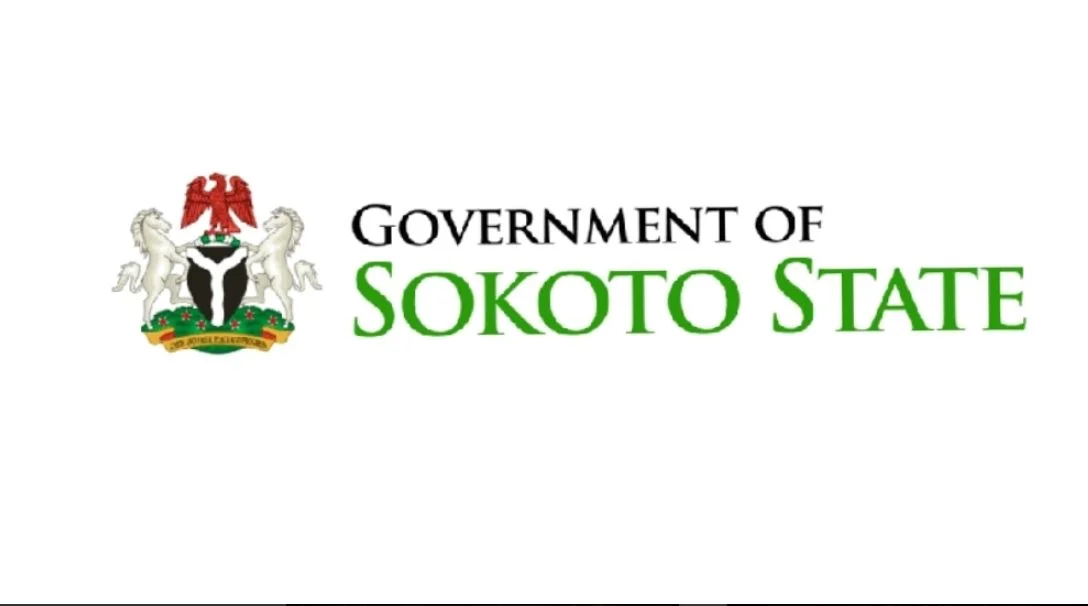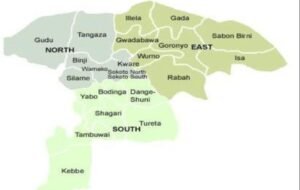This is the complete list of all the 23 local government areas In Sokoto State, Including their headquarters, and chairman names:
| S/N | LGA | Chairman |
|---|---|---|
| 1 | Binji | Dikko Nabunkari Jamali |
| 2 | Bodinga | Muhammad Shehu Dingyadi |
| 3 | Dange/Shuni | Aminu Magaji Bodai |
| 4 | Goronyo | Bashar Balla V |
| 5 | Gwadabawa | Ibrahim Aliyu Sakamaru |
| 6 | Isa | Shareef Abubakar Kamarawa |
| 7 | Rabah | Yusuf Muhammad Rabah |
| 8 | Kware | Ibrahim Attahiru |
| 9 | Sabon Birni | Ayuba Hashimu Dan Tudu |
| 10 | Silame | Abubakar Mohammed Daftarana |
| 11 | Shagari | Barr Maidawa Kajiji |
| 12 | Sokoto North | Jamilu Umar Gosta |
| 13 | Sokoto South | Yau Mohammad Danda |
| 14 | Tambuwal | Abba Shehu Tambuwala |
| 15 | Tangaza | Isah Salihu Bashir Kalanjeni |
| 16 | Tureta | Aliyu Abubakar |
| 17 | Wamakko | Umar Ahmad Dundaye |
| 18 | Kebbe | ABDULLAHI YARIMA KEBBE |
| 19 | Wurno | Abba Isah Sadiq Achida |
| 20 | Gada | Zayyanu Gada |
| 21 | Illela | Sirajo Shehu Maibala |
| 22 | Gudu | Buhari Alh Amadu Kurdula |
| 23 | Yabo | Muhammad Abubakar |
READ ALSO: Complete List Of LGAs In Kano State, Capital, And LGA Chairmen
Map Of Sokoto State Showing LGAs
What Is The Capital Of Sokoto State, Nigeria?
Sokoto Town, also known as Sakkwato is the capital of Sokoto State, Nigeria. Located in the extreme north-western region near the confluence of the Sokoto River and the Rima River, Sokoto boasts a population of over 427,760 as of 2006.
Well-known for its active trade, the city thrives on commerce in sheepskins, cattle hides, leather crafts, kola nuts, and goatskins.
The name “Sokoto” derives from Arabic roots, representing “market” in English. Its climate is seen by a hot semi-arid classification, with temperatures averaging around 28.3 °C annually.
Despite the heat, Sokoto experiences a rather bearable environment due to dryness and occasional rains during the rainy season from June to October.
Agriculture forms the backbone of Sokoto’s economy, with crops like millet, guinea corn, beans, maize, rice, and vegetables flourishing in its rich alluvial soil.
The region also has onion production, making Sokoto the major onion producer in Nigeria. Culturally, Sokoto State is mostly Muslim, with Hausa and Fulani ethnic groups comprising the majority.
Traditional festivities such as Eid-el-Fitri and Eid-el-Kabir punctuate the social calendar to celebrate the end of Ramadan and the act of Prophet Ibrahim respectively.
Economic activities in Sokoto expanded beyond agriculture to include local crafts such as blacksmithing, weaving, dyeing, carving, and leatherwork.
The presence of natural and mineral resources, including kaolin, gypsum, limestone, and phosphate, offers investment opportunities in different industries.
READ ALSO: Complete List Of LGAs In Jigawa State, Capital, And LGA Chairmen
List Of LGA In Sokoto State With Their Population
| No | LGA | 2022 Population Projection |
|---|---|---|
| 1 | Binji | 180,000 |
| 2 | Bodinga | 300,900 |
| 3 | Dange Shuni | 333,900 |
| 4 | Gada | 429,900 |
| 5 | Goronyo | 314,300 |
| 6 | Gudu | 164,700 |
| 7 | Gwadabawa | 399,700 |
| 8 | Illela | 259,100 |
| 9 | Isa | 259,400 |
| 10 | Kebbe | 212,600 |
| 11 | Kware | 231,400 |
| 12 | Rabah | 257,400 |
| 13 | Sabon Birni | 358,100 |
| 14 | Shagari | 270,800 |
| 15 | Silame | 180,500 |
| 16 | Sokoto North | 402,200 |
| 17 | Sokoto South | 341,200 |
| 18 | Tambuwal | 389,900 |
| 19 | Tangaza | 198,100 |
| 20 | Tureta | 118,100 |
| 21 | Wamakko | 309,400 |
| 22 | Wurno | 280,300 |
| 23 | Yabo | 199,000 |
Which Local Government Area Has The Highest Population In Sokoto State?
The local government area with the highest population in Sokoto State, Nigeria, is Gada LGA. Gada is one of the 23 Local Government Areas in Sokoto State, and it is located in the northern part of the state, sharing a border with the Republic of Niger.
The headquarters of Gada LGA is in the town of Gada. Covering an area of 1,315 square kilometers (508 square miles), Gada LGA has a significant population.
According to the 2022 population projection, the population of Gada LGA was recorded at 429, 900 people. This population is distributed across eleven political wards within the LGA, which include Gada, Kyadawa-Holai, Ilah-Dukamaje, Gilbadi, Kaffe, Tsitse, Kadadi, Kadassaka, Kaddi, Kiri, and Kwarma.
Reference Sources:


